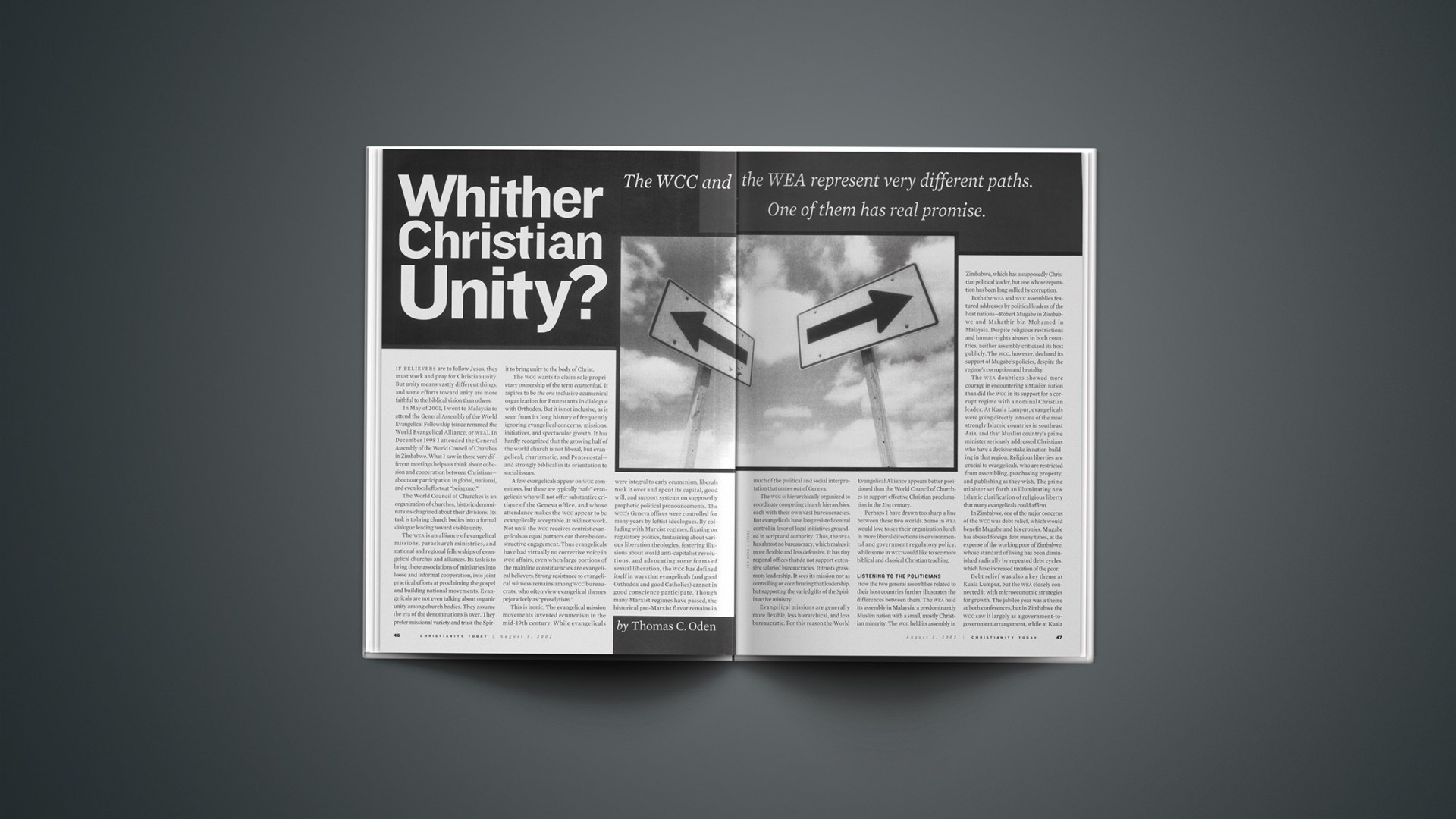A flurry of new acronyms is appearing on the ecumenical stage: ACR (The Association for Church Renewal); CCT (Christian Churches Together in the U.S.A.); FCFONA (Foundation for a Conference on Faith and Order in North America); GCF (Global Christian Forum). All affect evangelicals.
These acronyms represent attempts to transcend and to some extent replace, redefine, or reconfigure the older acronyms of the NCC (National Council of Churches) and the WCC (World Council of Churches), the carriers of ecumenical vitalities and viruses during their last 50 years.
The Global Christian Forum appears to look beyond the WCC to include evangelicals, Pentecostals, Roman Catholics and, in a more prominent way, the Orthodox. It met in Pasadena on June 20-24. The North American Faith and Order Foundation appears to be replacing the old NCC-controlled North American Conference on Faith and Order with a new organization that is independent of the NCC. It met at Notre Dame in November 2001. Christian Churches Together in the U.S.A. proposes a new beginning for American ecumenism with some limited evangelical inclusion, but ignoring most evangelical efforts of the last quarter century within the mainline denominations. It met in Chicago on April 4-6.
Evangelicals in North America receive reports of ecumenical activities with a wary eye, even if they intend to be inclusive of evangelicals and Pentecostals and more respectful of ancient ecumenical teaching.
In particular, evangelicals of Confessing and Renewing movements within the mainline churches should thoughtfully answer the CCT ‘s statement “An Invitation to a Journey.” CCT thinking is based on a dense misunderstanding of the evangelical reality within the mainline (the statement is posted on the NCC website at www.NCCcusa.org/news/02news48.html).
For more than a quarter century, more than 30 evangelical organizations have steadily defended classic Christian teaching and sought inclusion of evangelicals, traditionalists, and biblically orthodox Christians within the mainline. They have been coordinated by the Association for Church Renewal (cooperating informally since 1979 and formally organized in 1996). None of these organizations or their representatives were invited to participate in CCT. Evangelicals remain the unrepresented voices, yet they constitute 30 to 50 percent of the mainline lay membership.
Many of those who signed the CCT “Invitation” are those who led the old ecumenism astray. The invitation appears to be extended not by Christian leaders or laity, but by Christian churches themselves, assuming that they duly and fairly represent their memberships. Yet the Presbyterian Church (U.S.A.), the United Methodist Church, the United Church of Canada, and the United Church of Christ are all profoundly divided between unrepresented evangelicals and over-represented liberals.
This is not the post-NCC post-WCC “New Ecumenism” for which many traditional believers have hoped. It is a restatement of the old ecumenism that has every indication of continuing to be latitudinarian in doctrine, hierarchical in ecclesiology, soft on the sexual revolution, and with a strong bias toward a heavily regulated economy.
CCT is an invitation to churches (“We invite all churches”) to join a select organization of churches. This is vastly different from a call to unity based on apostolic truth. And it is not addressed to renewing and confessing movements within the wayward mainline churches that are now beginning to seek a deeper grounding in ancient ecumenical teaching.
The Pentecostal participants in these dialogues have made it clear that if NCC fingerprints are on the next step of recovering ecumenism, they will not participate. Evangelicals in the mainline must say the same with clarity.
Evangelicals within the mainline long for a deeper expression of the unity we share in our confession of Jesus Christ as the only Lord. We lament the divisions that ecumenism itself has caused and continues to reinforce. We long for the broken body of Christ to be made whole, but not apart from moral teaching on marriage and the family that honors God. Evangelicals lament the lack of unity at the Lord’s Table. But such efforts will not be blessed by God if they begin with a wrong step.
The organizations that compose the Association for Church Renewal see little of the repentance required to begin such a journey. They will have their first grassroots meeting in Indianapolis on October 24-26, and we will then see how the reconfiguration of evangelically informed ecumenical vision will more realistically develop.
Copyright © 2002 Christianity Today. Click for reprint information.
Related Elsewhere
Also appearing on our site today:
Whither Christian Unity?The WCC and WEA represent very different paths. One of them has real promise.
“An Invitation to a Journey” is available on the NCC website.










